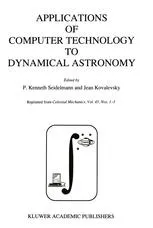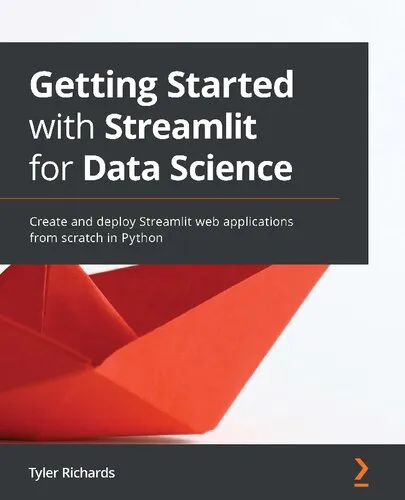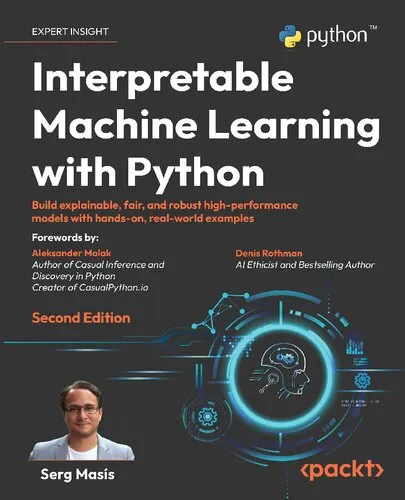Applications of Computer Technology to Dynamical Astronomy: Proceedings of the 109th Colloquium of the International Astronomical Union, held in Gaithersburg, Maryland, 27–29 July 1988
4.0
بر اساس نظر کاربران

شما میتونید سوالاتتون در باره کتاب رو از هوش مصنوعیش بعد از ورود بپرسید
هر دانلود یا پرسش از هوش مصنوعی 2 امتیاز لازم دارد، برای بدست آوردن امتیاز رایگان، به صفحه ی راهنمای امتیازات سر بزنید و یک سری کار ارزشمند انجام بدینکتاب های مرتبط:
معرفی کتاب
کتاب Applications of Computer Technology to Dynamical Astronomy وقایع رسمی 109امین کلوکیوم اتحادیه بینالمللی نجوم را که از 27 تا 29 جولای 1988 در Gaithersburg، مریلند برگزار شد، پوشش میدهد. این کتاب به بررسی نقش حیاتی فناوری کامپیوتر در شاخههای مختلف نجوم دینامیکی میپردازد. با ظهور فناوریهای مدرن و توسعه سریع نرمافزارهای محاسباتی، تحلیل دادهها و پیشبینی حرکتهای آسمانی با دقت بینظیری امکانپذیر شده است، و این کتاب به عنوان مرجعی ارزشمند در این زمینه شناخته میشود.
خلاصهای از کتاب
کتاب شامل مقالاتی است که توسط دانشمندان برتر حوزه نجوم دینامیکی در راستای بهرهبرداری از فناوریهای کامپیوتری نوشته شدهاند. نقطه تمرکز اصلی کتاب، بررسی الگوریتمهای پیشرفته، زبانهای برنامهنویسی، و کاربرد شبکههای عصبی مصنوعی برای حل مسائل پیچیده دینامیکی است. موضوعات دیگر شامل simulators پیشرفته برای بررسی پدیدههای نجومی، تکنیکهای مسیریابی فضاپیما، و روشهای مدلسازی مبتنی بر دادههای دقیق مشاهداتی است. این کتاب راهنمای جامعی برای دانشجویان، محققان، و کسانی است که نیازمند درک عمیقتر از کاربردهای فناوری کامپیوتری در حوزه نجوم هستند.
نکات کلیدی
- معرفی الگوریتمهای دقیق و بهینهسازی شده برای حل معادلات دینامیکی پیچیده.
- بررسی کاربرد big data در نجوم و تحلیل دادههای بزرگ.
- نقش simulation در مدلسازی پدیدههای نجومی و پیشبینی حرکتهای آسمانی.
- تکنولوژیهای جدید در تعامل با نرمافزارهای تحلیل دادههای نجومی.
نقل قولهای معروف
"Integration of computational advancements with celestial mechanics opens new horizons for exploring the universe systematically."
"The synergy of human intellect and machine computation marks a pivotal evolution in astronomy."
چرا این کتاب مهم است؟
این کتاب در دورهای نوشته شده است که علوم کامپیوتر و نجوم دینامیکی تازه در مسیر تحول خود قرار گرفته بودند. اهمیت این کتاب به این دلیل است که نشاندهنده تلاشهای اولیه در ادغام فناوریهای نوین کامپیوتری با علوم بنیادی نجومی بوده و دیدگاههایی ارزشمند از آغاز این انقلاب علمی را ارائه میدهد. کسانی که علاقهمند به درک زمینههای پیشرفته مانند مدارهای فضاپیما، simulations نجومی، و برنامهریزی مأموریتهای فضایی هستند، این کتاب را منبعی ضروری خواهند یافت. به ویژه، تأکید بر کار گروهی بین دانشمندان و مهندسان نرمافزار، خواننده را به درک بهتر اهمیت تعاملات علمی-فنی سوق میدهد.
Introduction to "Applications of Computer Technology to Dynamical Astronomy"
The book "Applications of Computer Technology to Dynamical Astronomy" offers a fascinating and comprehensive exploration into the synergy between advanced computational technologies and the field of dynamical astronomy. As a collection of proceedings from the 109th Colloquium of the International Astronomical Union (IAU), held in Gaithersburg, Maryland, from July 27–29, 1988, this work captures the essence of collaborative research and innovation at the intersection of astronomy, mathematics, and computer science. Edited by P. Kenneth Seidelmann and Jean Kovalevsky, the book holds immense relevance for researchers, academicians, and students alike who are deeply interested in the computational advancements that have shaped modern astronomical studies.
Dynamic modeling of celestial mechanics has played a pivotal role in understanding the universe. From studying the orbit of planets and satellites to exploring the evolution of galaxies, computational methods have become indispensable in tackling the complexity of dynamical problems. This book consolidates a range of work presented by distinguished scientists and researchers, providing readers with both the theoretical foundations and practical applications of computational techniques in astronomy.
Each chapter in this volume addresses a unique aspect of the vast domain of dynamical astronomy—ranging from orbit determination and numerical integration techniques to simulations of celestial perturbations and computer-aided celestial navigation. The contributors examine and discuss innovative solutions to age-old astronomical challenges and how the burgeoning field of computer technology has revolutionized our approach to them. Furthermore, this book also reflects on the progress achieved up until the late 1980s, highlighting the remarkable strides in computation and their implications for advancing our knowledge of space.
Detailed Summary of the Book
The book is divided into multiple papers and discussions, each crafted to address a specific problem or opportunity within the domain of dynamical astronomy. The opening chapters lay a firm foundation by introducing fundamental concepts, such as how numerical methods are integrated into celestial mechanics. Topics such as the role of high-speed computers in calculating ephemerides and simulating planetary and satellite motion are explored in detail.
The contributions span applications in mathematical modeling, including the implementation of advanced algorithms to solve n-body problems and integrate differential equations. A significant portion of the proceedings tackles orbit determination in the context of both natural and artificial celestial objects. As satellites and space-probe missions became increasingly frequent during the era, the advances in computational orbit analysis showcase the ability to refine predictions with precision unmatched by earlier methods.
Another key focus lies in the application of computational tools to study gravitational perturbations and resonance phenomena—describing how bodies in space influence one another’s trajectories over time. The proceedings also emphasize visualization, computer simulation of long-term celestial interactions, and the development of databases for astronomical measurements.
Overall, the volume offers a unique mix of historic milestones and forward-looking perspectives, making it a treasure trove for anyone interested in how computation revolutionized the field.
Key Takeaways
- The essential role of computational algorithms in solving complex dynamical problems in astronomy.
- Advances in numerical integration techniques and their implications for orbit predictions.
- The interplay between observational data and computational tools to refine theories of celestial mechanics.
- Applications of computer technology to improve the accuracy of ephemerides and space navigation systems.
- Collaborative efforts between mathematicians, computer scientists, and astronomers in advancing the field of dynamical astronomy.
Famous Quotes from the Book
The book offers numerous insights and thought-provoking statements by leading experts of the time. While the proceedings themselves are technical, several quotes highlight the profound impact of computational astronomy:
"The future of celestial mechanics lies in the seamless collaboration between algorithmic sophistication and computational speed."
"The art of algorithm design is as important in astronomy as the telescope was to Galileo."
Why This Book Matters
In an era when computation was beginning to transform every field of science, this book stands as a timely record of the progress made in integrating computer technology with astronomical research. It demonstrates the remarkable potential of multidisciplinary approaches to solving complex problems. The discussions and findings presented within its pages have left an enduring legacy, shaping how astronomers employ computational tools to understand the theories governing celestial motion.
This book is more than just a snapshot of history—it is a guide for students and professionals who wish to build on the pioneering efforts described here. By examining the successes and challenges faced in the late 20th century, readers can better appreciate the foundations upon which today’s advancements in computational astronomy are built.
دانلود رایگان مستقیم
شما میتونید سوالاتتون در باره کتاب رو از هوش مصنوعیش بعد از ورود بپرسید
دسترسی به کتابها از طریق پلتفرمهای قانونی و کتابخانههای عمومی نه تنها از حقوق نویسندگان و ناشران حمایت میکند، بلکه به پایداری فرهنگ کتابخوانی نیز کمک میرساند. پیش از دانلود، لحظهای به بررسی این گزینهها فکر کنید.
این کتاب رو در پلتفرم های دیگه ببینید
WorldCat به شما کمک میکنه تا کتاب ها رو در کتابخانه های سراسر دنیا پیدا کنید
امتیازها، نظرات تخصصی و صحبت ها درباره کتاب را در Goodreads ببینید
کتابهای کمیاب یا دست دوم را در AbeBooks پیدا کنید و بخرید
1160
بازدید4.0
امتیاز0
نظر98%
رضایتنظرات:
4.0
بر اساس 0 نظر کاربران
Questions & Answers
Ask questions about this book or help others by answering
No questions yet. Be the first to ask!






![The Ultimate iOS Interview Playbook: Conquer Swift, frameworks, design patterns, and app architecture [Team-IRA]](https://s3.refhub.ir/images/thumb/The_Ultimate_iOS_Interview_Playbook__Conquer__29925.webp)







